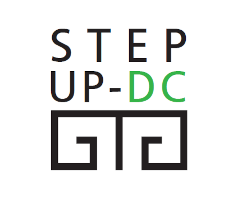Session 7C, DRAMA EDUCATION - 1- Education for Democratic Citizenship: Drama/Theatre Education as a Democratic Process of Learning
STEPUP-DC Project

Course DescriptionBasic Topics
Children’s voice for participation in education
Duration
The duration of the session is 9 hours (3 reading + 3 learning + 3 working/practicing)
Objectives
The Objectives of this session are:
- Support students in exploring feelings, behaviors, consequences, attitudes through taking on role
- Support students in participating in small group drama and whole group drama for Democratic Citizenship
- Develop students’ confidence in leading initiatives and developing educational programmes on EDC/HRE/IE through Theatre Education
Learning outcomes
After completion of the session students will:
- Be able to guide pupils in critically examine and express key concepts related to democratic culture and intercultural dialogue
- To re-examine and experiment with drama and narration forms in and out of role.
- To create lessons and teach theatre/drama in primary and secondary education based on democratic culture and improvisation.
Outcomes and CDC
- Knowledge and critical understanding
- 1802: Can describe the ways in which his/her thoughts and emotions influence his/her behaviour (basic)
- 1901: Can explain how tone of voice, eye contact and body language can aid communication (basic)
- 1904: Can explain how different forms of language are used in different situations and contexts (intermediate)
- 2012: Can describe the diverse ways in which citizens can influence policy (advanced)
- 2014: Can reflect critically on the nature and purposes of democratic political processes (advanced)
- Values
- Valuing democracy, justice, fairness, equality and the rule of law
- 102: Argues that specific rights of children should be respected and protected by society (basic)
- 103: Argues that everyone should recognise the fundamental freedoms of each human being
(basic)
- 108: Expresses the view that all laws should be consistent with international human rights norms and standards (advanced)
- Attitudes
- 402: Expresses interest in travelling to other countries (basic)
- 403: Uses opportunities to meet new people (basic/intermediate)
- 507: Expresses respect for different opinions or ideas unless they violate human rights (intermediate)
- 611: Is actively involved in community issues (intermediate/advanced)
- 610: Expresses commitment to sustaining and safeguarding the human rights of other people (intermediate)
- Skills
- 1005 Can identify gaps in his/her own knowledge independently (basic/intermediate)
- 1017: Can integrate learning from various subjects/areas of learning (intermediate/advanced)
- 1109: Can make connections between arguments and information (intermediate/advanced)
- 1115: Can reflect critically on past experiences in order to inform future progress (basic/intermediate)
Children’s voice for participation in education
The duration of the session is 9 hours (3 reading + 3 learning + 3 working/practicing)
The Objectives of this session are:
- Support students in exploring feelings, behaviors, consequences, attitudes through taking on role
- Support students in participating in small group drama and whole group drama for Democratic Citizenship
- Develop students’ confidence in leading initiatives and developing educational programmes on EDC/HRE/IE through Theatre Education
After completion of the session students will:
- Be able to guide pupils in critically examine and express key concepts related to democratic culture and intercultural dialogue
- To re-examine and experiment with drama and narration forms in and out of role.
- To create lessons and teach theatre/drama in primary and secondary education based on democratic culture and improvisation.
- Knowledge and critical understanding
- 1802: Can describe the ways in which his/her thoughts and emotions influence his/her behaviour (basic)
- 1901: Can explain how tone of voice, eye contact and body language can aid communication (basic)
- 1904: Can explain how different forms of language are used in different situations and contexts (intermediate)
- 2012: Can describe the diverse ways in which citizens can influence policy (advanced)
- 2014: Can reflect critically on the nature and purposes of democratic political processes (advanced)
- Values
- Valuing democracy, justice, fairness, equality and the rule of law
- 102: Argues that specific rights of children should be respected and protected by society (basic)
- 103: Argues that everyone should recognise the fundamental freedoms of each human being
(basic) - 108: Expresses the view that all laws should be consistent with international human rights norms and standards (advanced)
- Valuing democracy, justice, fairness, equality and the rule of law
- Attitudes
- 402: Expresses interest in travelling to other countries (basic)
- 403: Uses opportunities to meet new people (basic/intermediate)
- 507: Expresses respect for different opinions or ideas unless they violate human rights (intermediate)
- 611: Is actively involved in community issues (intermediate/advanced)
- 610: Expresses commitment to sustaining and safeguarding the human rights of other people (intermediate)
- Skills
- 1005 Can identify gaps in his/her own knowledge independently (basic/intermediate)
- 1017: Can integrate learning from various subjects/areas of learning (intermediate/advanced)
- 1109: Can make connections between arguments and information (intermediate/advanced)
- 1115: Can reflect critically on past experiences in order to inform future progress (basic/intermediate)
A series of resources that the student teacher must study in this session and a series of additional resources for further study.
A full paper and additional e-lessons on the topics of the session and additional interactive presentation of the materials, for the student teachers to study all the materials in a row.
A series of authentic, up to date and relevant activities with their accompanying materials, which deliver the intended learning outcomes of the session and are carried out face to face or E-learning with groups of student teachers.
Several types of questions to evaluate how much the student teachers have learned throughout the session (reading material, learning material and workshop).
Calendar
Announcements
- - There are no announcements -
